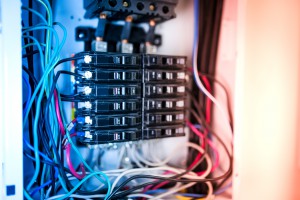Why Your Electrical Panel Might be a Hazard
If your home or commercial building has an older electrical panel, you might want to consult an electrician to determine the safety of the panel and the breaker system. Most of you have heard of electrical fires. These happen when there is a surge of electricity improperly handled by the breaker, resulting in overheating the wires which may then catch fire. If you are unsure, better to be safe than sorry. In addition, there are other factors that play a role in determining whether your electrical panel may be a hazard.
The biggest percentage of electrical fires, at least in the United States, can be attributed to faulty wiring. It may have been appropriate at the time of installation, but additions and upgrades to the building may have caused it to become outdated. If yours or your electrician’s checking the wiring reveals substandard code or deterioration, it is time for an electrical panel upgrade. Some warning signs that you might heed include flickering lights, a mild shock or “tingling” when touching a switch or appliance, discolored outlets or the smell of something burning. Of course, sparks are always something to be concerned about.
If your building has a fuse panel, it generally indicates construction prior to 1960. Modern households require amperages of between 100 and 400, while fuses can only provide 30, 50, 60 or 90 amps for the whole house. Fuses increase the risk of fire and should be replaced with modern circuit breakers.
Another warning sign is when your circuit breaker trips frequently. If you have recently added appliances that can add load to the building’s electrical capacity, this may be the cause. A professional will have the appropriate solution.
Don’t wait until you’re putting out an electrical fire. The warning signs mentioned here are not all-inclusive. If your building is older or you just want to be safe, call in an electrician for a professional analysis of your system. Don’t be the one thinking “What if….?”

